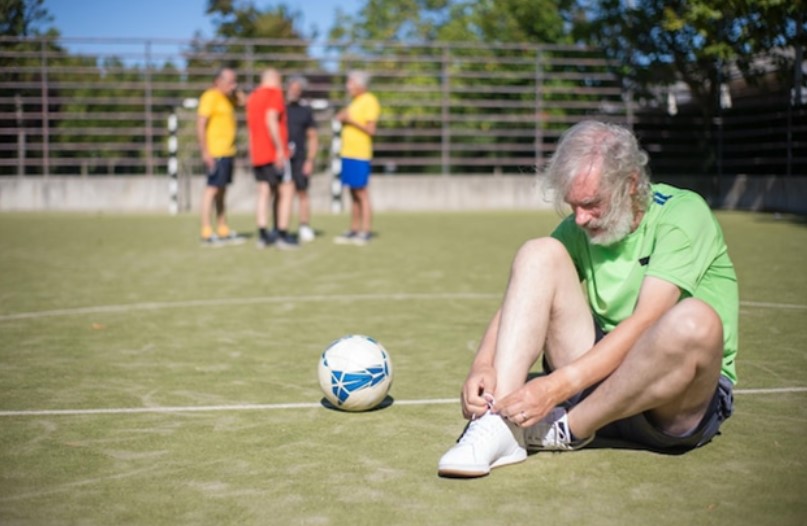What makes senior football leagues unique?
Senior football leagues are designed for players aged 35 and above, with a focus on fun, socializing, and exercise rather than winning. Modified rules are often in place to suit the age of the players. These leagues offer an excellent chance to stay active and make new connections.Benefits of joining a senior football league
Joining a senior football league can bring several benefits for individuals in their later years. Here are some advantages of participating in a senior football league:- Physical fitness: Football is a physically demanding sport that involves running, kicking, and coordination. Engaging in regular training and matches can help improve cardiovascular fitness, strength, flexibility, and overall physical well-being. It provides a means to stay active and maintain a healthy lifestyle, which is crucial for seniors to maintain mobility and prevent age-related health issues.
- Social interaction: Joining a senior football league offers an opportunity to socialize and interact with like-minded individuals who share a passion for the sport. It provides a sense of belonging, camaraderie, and an avenue to build new friendships. Regular team practices, matches, and social events create a supportive and enjoyable community.
- Mental stimulation: Football requires strategic thinking, decision-making, and teamwork. Engaging in the sport stimulates cognitive abilities, improves concentration, and helps keep the mind sharp. It offers mental challenges and a sense of purpose, which can be particularly beneficial for seniors in maintaining mental acuity and preventing cognitive decline.
- Stress relief and emotional well-being: Participating in football can be an excellent stress reliever and mood booster. The physical activity and the release of endorphins during exercise promote feelings of happiness and reduce stress and anxiety. The social aspect of being part of a team and the enjoyment derived from playing the sport can contribute to improved emotional well-being.
- Skill development: Joining a senior football league provides an opportunity to learn and develop new skills. Whether you are a seasoned player or new to the sport, practicing and playing with others can enhance your football abilities, improve technique, and expand your knowledge of the game. It allows for personal growth and a sense of achievement as you see yourself progress and contribute to the team’s success.
- Competitive spirit: Football is a competitive sport, and participating in a senior league allows you to indulge in friendly competition. The thrill of playing matches, setting goals, and striving to win can reignite your competitive spirit and provide a sense of excitement. It offers an outlet for healthy competition and can be a motivating factor for maintaining fitness and improving skills.
- Sense of purpose and structure: Joining a senior football league provides a structured schedule of training sessions and matches, giving you a sense of purpose and a reason to stay active. It offers a routine and a commitment that can help seniors maintain discipline, time management skills, and a regular exercise regimen.

Eligibility criteria for senior football leagues
Eligibility for participating in senior football leagues depends on several factors apart from Senior Football Leagues. These include meeting age requirements (usually starting at 40 or 50), having previous football experience or a certain skill level, being physically fit to participate in regular practices and games and paying membership fees if applicable. Some popular Senior Football leagues in Ireland are Saturday Munster Senior League and Premier Division.
Age requirements and exceptions
Players looking to join senior football clubs will want to ensure they meet the eligibility requirements for their local league. While most senior football leagues require players to be at least 55 years old, some will allow players as young as 50 or as old as 70. It’s worth noting that some leagues may also have exceptions based on certain criteria such as disability or military service. To avoid any issues with registration or participation, make sure to confirm eligibility with your local league before joining.
Physical fitness expectations
Maintaining physical fitness is crucial for participating in senior football leagues. Expectations may include endurance, strength, and flexibility. To ensure player safety, some leagues require medical evaluations prior to participation. For those interested in joining senior football, the Saturday Premier Division and Munster Senior League offer opportunities for competitive play beyond age 50 or 55.
Rules and regulations of senior football leagues
The rules and regulations of senior football leagues vary from league to league, but there are some general principles that are common to most leagues. These include:
- The game is played between two teams of eleven players each.
- The object of the game is to score more goals than the other team.
- A goal is scored by kicking or heading the ball into the other team’s net.
- A match is played over two halves of forty-five minutes each.
- The referee has the authority to make decisions on the field of play and his decisions are final.
- Players must not use excessive force or foul play.
- Players must not use abusive language or gestures.
- Players must not be in a state of intoxication.
In addition to these general principles, there are also a number of specific rules that vary from league to league. These rules may cover things such as:
- The type of equipment that can be used
- The number of substitutes that can be made
- The procedure for dealing with fouls and misconduct
- The procedure for resolving disputes
It is important to check the rules of the specific league that you are playing in before you participate in a match. This will help you to avoid any penalties or sanctions.
Here are some additional rules that may be found in senior football leagues:
- Players must be registered with the league before they can play.
- Players must wear the approved uniform of their team.
- Players must not use any equipment that is dangerous to other players.
- Players must not use any language or gestures that are offensive to other players or spectators.
- Players must not interfere with the referee’s decisions.
Players who break the rules may be penalized by the referee. Penalties may include:
- A warning
- A yellow card
- A red card
A yellow card is a caution and a player who receives a yellow card will be suspended for the next match. A red card is an expulsion and a player who receives a red card will be suspended for a number of matches.
In addition to the rules and regulations that are set by the league, there are also a number of ethical considerations that players should be aware of. These include:
- Respecting the referee’s decisions
- Playing fair
- Not using excessive force
- Not using abusive language or gestures
- Not being in a state of intoxication
By following the rules and regulations of senior football leagues, players can help to ensure that the game is played in a safe and enjoyable environment.

Game format and scoring system
Different from traditional football leagues, senior football leagues offer unique game formats and scoring systems. Whether your interest lies in premier division or Munster Senior League on Saturday evenings, understanding the specific rules and regulations is crucial before getting started. The league you are interested in joining might use the traditional 11v11 format or possibly a smaller field with modified rules for senior football. You may come across different scoring systems such as point system based on wins and losses or even goal difference system.
Player conduct and sportsmanship
To ensure a safe and enjoyable environment for all players, it’s important that participants in senior football leagues follow strict guidelines regarding player conduct and sportsmanship. This includes avoiding foul language and unsportsmanlike behavior while on the field. Physical or verbal abuse towards fellow players, coaches, or referees is strictly prohibited. Staying true to these regulations can help maintain a positive experience for everyone involved in senior football leagues. Additionally, leagues like the Munster Senior League often have codes of conduct that outline expectations for player behavior both on and off the field.
Training techniques and nutrition habits
Here are some training techniques and nutrition habits that can help senior football players perform at their best:
Training techniques
- Strength training: Strength training is important for building muscle mass and strength, which can help players improve their performance on the field. Senior football players should focus on compound exercises that work multiple muscle groups at once.
- Cardio training: Cardio training is important for improving cardiovascular health and endurance. Senior football players should focus on aerobic activities such as running, swimming, or biking.
- Speed training: Speed training can help players improve their acceleration and sprinting speed. Senior football players can do this by sprinting short distances, such as 20 to 40 yards.
- Agility training: Agility training can help players improve their ability to change direction quickly. Senior football players can do this by doing drills such as figure-eights and slaloms.
- Skill training: Skill training can help players improve their passing, kicking, and catching skills. Senior football players can do this by practicing with a ball or by playing in pickup games.
Nutrition habits
- Eat a balanced diet: Senior football players should eat a balanced diet that includes plenty of fruits, vegetables, whole grains, and lean protein. They should also limit their intake of processed foods, sugary drinks, and unhealthy fats.
- Stay hydrated: Senior football players should drink plenty of fluids, especially water, before, during, and after games and practices.
- Get enough sleep: Sleep is essential for recovery and muscle growth. Senior football players should aim for 7-8 hours of sleep per night.
In addition to these general tips, senior football players should also listen to their bodies and rest when they need to. It is important to avoid overtraining, as this can lead to injuries. By following these tips, senior football players can stay healthy and perform at their best.
Let’s Sum Up
Senior football leagues present an excellent opportunity for players to stay active and competitive, regardless of age. The different league levels offer a range of challenges, and joining a senior football league can provide numerous benefits, from improved physical fitness to social connections. To find local senior football leagues in your area, research online or ask around at local sports centers. Eligibility criteria vary by league but generally require meeting age and physical fitness requirements. It’s important to follow the rules and regulations of the league, including game format, scoring system, player conduct, and sportsmanship. To stay active and competitive in senior football leagues, focus on training techniques and nutrition habits that support your overall health.
Keep playing the game you love while staying fit and healthy – it’s never too late to join a senior football league!



